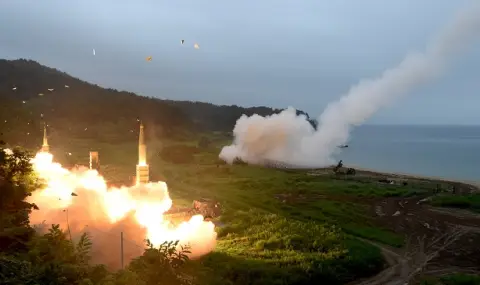< p>Ukrainian forces launched a drone strike against a Russian ammunition depot in Sergeevka, Voronezh Oblast on the night of July 6-7. The Ukrainian publication Suspilne cited its sources as saying that the Ukrainian security service carried out the attack. The ammunition depot contained rockets, tank and artillery ammunition and small arms ammunition.
This is written in the new report of the Institute for the Study of War (ISW).
Geolocated footage released on July 7 taken near Morozovka, Voronezh Oblast (northeast of Sergeevka on the M2 highway) shows smoke and explosions with secondary detonations visible in the distance.
The Governor of Voronezh Oblast, Alexander Gusev, said on July 7 that Russian air defense systems had destroyed several Ukrainian drones over Voronezh Oblast, and that their debris had fallen on a warehouse in Podgorensky District, causing a fire and secondary explosions.
NASA's Fire Information Resource Management (FIRMS) data from July 7 found anomalous heat signals near Sergeevka.
Satellite images confirm that the Ukrainian Air Force carried out a successful strike against a Russian regimental command post in the Belgorod region in late June 2024. Possibly with Western-supplied weapons, further demonstrating how Ukraine can thwart Russian offensives operations if it continues to lift restrictions on weapons to strike military targets.
The Ukrainian General Staff reported on June 23 that the Ukrainian Air Force struck the command post of an unspecified Russian motorized rifle regiment in Nekhoteevka, Belgorod Oblast on an unspecified date.
Geolocated footage of the strike shows the command post was less than a kilometer from the Russian-Ukrainian border.
They show significant damage to the building that reportedly housed the Nekhoteevka command post.
Ukrainian forces are believed to have used a French-made Armament Air-Sol Modulaire Hammer precision-guided bomb.
The location of the command post near the front line in the northern part of Kharkiv Oblast suggests that it was involved in ongoing Russian offensive operations north of the city of Kharkiv.
The Nekhoteevka strike demonstrated Ukraine's ability to successfully strike Russian military targets in Russia using Western-supplied weapons to curtail Russian offensive operations in Ukraine. ISW continues to believe that Ukraine should use weapons provided by the West, including ATACMS missiles, to strike Russian military targets.
Ukrainian drone operators appear to be improving their ability to intercept Russian drones with longer range in the air, and these technological innovations could allow Ukrainian forces to relieve pressure on short- and medium-range air defense assets if successful used at scale. Footage released on June 1 shows Ukrainian forces using drones for a first-person view to shoot down a Russian tactical reconnaissance drone "Zala" and medium-range reconnaissance drone "Orlan-10" during flight in the area of Velika Novosilka.
Ukraine's Kharkiv Group of Forces released footage on June 29 showing a Ukrainian FPV drone intercepting a Russian Lancet munition that was traveling through the air in the direction of Kharkiv.
Both Ukrainian and Russian forces appear to be improving their ability to use FPV drones to intercept other FPV drones at the tactical level, but ISW has yet to receive confirmation of Russian forces using FPV drones to strike Ukrainian munitions or reconnaissance drones with a longer range in the air.
Russian forces have taken advantage of restrictions on Ukrainian air defense assets in recent months to operate fixed-wing reconnaissance drones more freely in Ukraine, including deep in the Ukrainian rear, possibly allowing Russian forces to improve their reconnaissance fires and reconnaissance strike complexes (RFC/RSC).
Russian and Ukrainian forces are currently engaged in a race between technological offense and defense, and Ukraine's ability to implement technological innovation at scale, ahead of Russia's adaptations, is critical to Ukraine's ability to offset Russia's current military advantages attitude.
The forces of the Chechen special forces "Akhmat" may have forced a Russian blogger to issue a public apology after he criticized the forces of "Ahmat" - a telling example of unprofessionalism in the Russian army. An often critical Russian blogger said on June 5 that the "TikTokers" "stand behind" conscripts in the Belgorod region, implying that the Chechen forces "Akhmat" do not contribute to the ongoing Russian offensive operations in the direction of Kharkiv.
The blogger later posted an apology video on July 7, in which the blogger sits with a soldier from the "Aida" of special forces "Ahmat" and admits that he meant the powers of "Ahmat" like "tiktokers".
On July 7, the blogger stated that he had met with commander Apti Alaudinov and that Akhmat's forces were actually fighting on the front line in the direction of Kharkiv. The blogger in particular criticizes the Russian military command for the lack of progress and significant losses in the direction of Vovchansk.
Russian bloggers have previously criticized "Akhmat" for not contributing to Russian military operations and visiting frontline areas only for propaganda purposes, and Chechen officials have publicly tried to repair their reputation.
The Kremlin has recently cracked down on criticism of the Russian military in the Russian media space, and Alaudinov's immediate intervention in the matter after the blogger's July 5 video demonstrates the extreme measures that select members of the Russian military command are capable of taking to suppress the critical voices.
The response of the forces "Ahmat" of the blogger's video also demonstrates the widespread unprofessionalism in the Russian military, as the forces appear to have taken matters affecting their reputation into their own hands.
